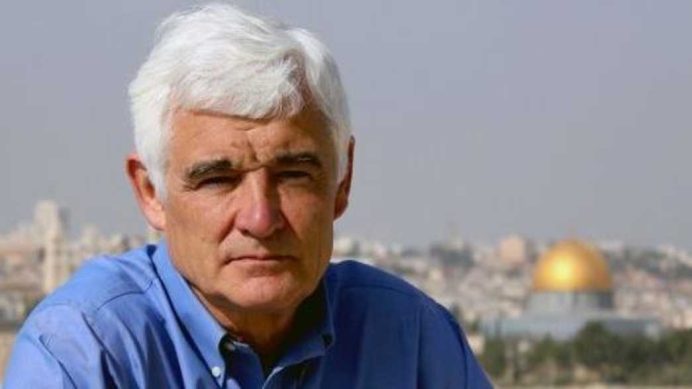Documentary maker John Ware explains why he has brought three successful court cases against those who he believed had defamed him and the BBC Panorama programme he made about antisemitism in Corbyn‚Äôs Labour Party. ¬†‚ÄėTesting the evidence before a Judge was the only way to set the record straight for me, my BBC colleagues and the many Jews demeaned by this uncompromising assault‚Äô he writes.
On my home from Christmas shopping in Oxford Street in 2019, I passed by the BBC at New Broadcasting House where I saw about 40 fifty-somethings waving Jewish Voice for Labour placards and a Palestinian flag.
The demo was directed at me and my Panorama ‚ÄėIs Labour antisemitic?‚Äô transmitted five months earlier and was organised by the publisher of a website called ‚ÄėPress-Gang exposing Rogue journalisms‚Äô.
Paddy French‚Äôs campaign accused me of deliberately deceiving 2m viewers by knowingly exaggerating the ‚Äėextent and nature‚Äô of antisemitism in Labour under Jeremy Corbyn.
He disseminated his ‚Äėevidence‚Äô in glossy pamphlets and to thousands on social media parroting the language of a quasi-statutory body with portentous assertions like ‚ÄėOur Charge sheet…‚Äô and ‚ÄėThis damning report finds against the BBC…‚Äô
300 pamphlets were printed to be sent to broadcast and newspaper editors to inflict maximum harm on my reputation and BBC Journalism. Flyers were handed out to BBC employees.
My motive for knowingly deceiving 2m viewers?¬†To help stop Corbyn becoming prime minister, according to French ‚Äď despite my having accused Boris Johnson of lying as prime minister in another documentary just three weeks before the 2019 election.
Undermining Panorama has been central to Corbynite attempts to rewrite history because they consider the programme helped deprive Corbyn of the premiership.
Amongst French‚Äôs supporters were celebrity Corbynites Ken Loach and the multi-millionaire co-founder of Pink Floyd, Roger Waters, French‚Äôs main financial backer. In one of Waters‚Äô social media tirades against me, he said I was ‚Äėentirely controlled by the Oligarchs….bought and paid for‚Äô.
For months French had told his supporters that only a trial offered the ‚Äėunique opportunity for the issue of antisemitism in Jeremy Corbyn‚Äôs Labour party to be explored in a forensic setting.‚Äô
French said his lawyers were ‚Äėconfident‚Äô he had ‚Äėa strong defence‚Äô and that a ‚ÄėLandmark John Ware¬†v Paddy French libel trial will decide who was right in the Labour antisemitism issue.‚Äô
But as the trial date drew close, French said he wouldn’t be coming to court after all. He announced to his financial backers there was no longer any need to contest my claims, because others had made his case for him, and anyway a ruling earlier in the case had prevented him from defending himself.
Giving judgment last week in the High Court, Mr Justice Knowles said this was a ‚Äėknowing, deliberate and cynical distortion‚Äô of the truth. The ruling had not deprived French of ‚Äėany ability to defend himself on the grounds of truth, public interest or any other defence he wished to plead and advance.‚Äô French‚Äôs ‚Äėwhole attitude to these proceedings‚Äô had been ‚Äėone of contempt.‚Äô
Meanwhile, French stayed in his house in the south of France.
He knew I had no desire to bankrupt him ‚Äď and that an apology, minimal damages and my costs would suffice. But French chose to leave his fate to the court who‚Äôve now awarded me ¬£90,000 in damages for his ‚Äėaggravating conduct‚Äô and my costs. He‚Äôs also had to apologise.
French was the last of my three cases against Corbyn’s Labour and his supporters who’ve tried to destroy every vestige of Panorama’s credibility, belittling the anxieties of many Jews as antisemitism secured a foothold in the party.
The case brings to some ¬£5.6m, the total estimated cost to Corbynites thus far from losing 17 out of 23 cases, the vast majority defamation and antisemitism related.¬†Another six are ongoing. The final bill could be double. French says that by suing a fellow journalist I‚Äôve breached a sacred convention and made a fundamental assault on free speech. In my view that‚Äôs a whiskery bit of nostalgia. To paraphrase the Irish poet WB Yates, since social media licensed mass character assassination, all is ‚Äėchanged, changed utterly.‚Äô As my lawyer Mark Lewis says, social media has made ‚Äėeverybody a publisher unhampered by the shackles of an editor or advice on what may or may not constitute a defamatory or libellous remark.‚Äô
Corbyn supporters make much of their progressive and anti-racist credentials. Yet French made the odious suggestion that Panorama had used ‚Äėwhat appears to be a woman of British Muslim-heritage to voice‚Äô the Labour Party‚Äôs 16 written responses in the programme in order to ‚Äėgive the impression that Labour is more sympathetic to Muslims than Jews.‚Äô
He also suggested the fact that my wife and children are Jewish might have breached BBC impartiality guidelines. ‚ÄėI find this particularly distasteful,‚Äô said the Judge. ‚ÄėNo credible or reputable journalist could possibly have thought that the Claimant‚Äôs family‚Äôs faith had any relevance to the accuracy, or otherwise, of the Programme.‚Äô
Is it just coincidence that of the 100 or more documentaries I have made, this one about antisemitism attracted by far the most venomous criticism, and was subjected to vastly more scrutiny in multiple forums: the BBC’s Executive Complaints Unit,  Ofcom, and the courts, both by way of Judicial Review, and Defamation? To the intense frustration of the Corbynites, it has survived scrutiny in all of them.
So relentless have been the allegations against me and Panorama that my many rebuttals have been largely ignored. Testing the evidence before a Judge was the only way to set the record straight for me, my BBC colleagues and the many Jews demeaned by this uncompromising assault.
Supported by interviews from seven whistle-blowers in Labour’s Governance and Legal Unit (GLU) Panorama’s thrust was that antisemitism within Labour had markedly increased under Corbyn’s leadership and that he hadn’t done enough to eradicate it. The Corbynites argue the reverse: the crisis was caused by the failure of the GLU under Formby’s predecessor Iain McNicol to grip the crisis in the first place.
They say the number of investigations, suspensions and expulsions went up exponentially once Corbyn got control of Party HQ under his appointed General Secretary Jenny Formby.¬†A more careful reading of the facts reveals a more nuanced picture. Whilst there certainly were major improvements in complaints processing during Formby‚Äôs tenure from March 2018 onwards, it‚Äôs far too simplistic to credit Formby and Corbyn with all of them, and to blame McNicol and his team for everything that went wrong. This is quite apart from the shortcomings in Corbyn‚Äôs leadership over the antisemitism crisis ‚ÄĒ which some who were close to him have today privately acknowledged to me. The Equalities Commission‚Äôs statutory investigation similarly found there‚Äôd been a failure of leadership.
Here‚Äôs one reason why suspensions under McNichol were low. Statements to the Equalities Commission record how ‚Äėsuspensions pending investigation‚Äô were discouraged by Corbyn‚Äôs office, who told senior management: ‚ÄėJeremy doesn‚Äôt like it.‚Äô The Chakrabarti report commissioned by Corbyn likewise recommended suspensions be used sparingly. Labour‚Äôs NEC then introduced a category below ‚ÄėSuspension‚Äô called ‚ÄėNotice of Investigation.‚Äô
More importantly, the complaints system was inherently dysfunctional ‚Äď and remained so well into Formby‚Äôs era, because no complaints system in any political party on earth could have tackled that tsunami of complaints that deluged the GLU after Corbyn became leader.
According to last Summer‚Äôs report by Martin Forde KC into the various competing claims, in 2016 ‚Äď the first full year of Corbyn‚Äôs leadership ‚Äď there were some 5,000 unresolved complaints, almost 1500 relating to antisemitism alone. The numbers then continued to rise exponentially. Small wonder that many were lost track of, as has been alleged.
As Vice Chair of the NEC during McNicol‚Äôs time in office, Formby did not exactly help. She blocked McNicol‚Äôs proposal to hire nine regional investigators, which Forde says was ‚Äėin essence‚Äô a ‚Äėgood idea‚Äô to ‚Äėhelp address the problems in the complaints and disciplinary process‚Äô but which ‚Äėappears to have been opposed, and eventually thwarted by opposition from LOTO and the left on the NEC.‚Äô Meanwhile, the GLU struggled to reform a necessarily chaotic system with the gradual introduction of a proper system for tracking the avalanche of complaints.
Due to software¬†problems, that system only began to bear fruit some months after Formby took over. Another initiative ‚ÄĒ to accelerate the adjudication of complaints by using three person NEC panels meeting more frequently than the entire NEC ‚ÄĒ was also drafted by the GLU under McNicol and it significantly increased throughput. Under the Director of Governance, Emilie Oldknow, the establishment of an antisemitism working group on the NEC was also proposed. This came into fruition as Formby took over and was enthusiastically embraced by amongst others, two Corbyn supporters who happened to be Jewish, Jon Lansman and Rhea Wolfson ‚Äď both knowledgeable about the growth and manifestations of Left-wing antisemitism. None of these were changes designed and developed under Formby, and none of them were even mentioned on Al Jazeera.
And while there were improvements under Formby, progress was also erratic. Due to major staff shortages, fewer Notice of Investigations were served in the last quarter of 2018 before Formby took over than in the first quarter of 2019 after she had been in post for almost a year. In Q4 of 2019 under Formby, the number of investigations opened plummeted ‚Äď for the same reason little got done in Q2 2017 under McNicol: in both quarters there were general elections and for the GLU, as for all party officials, it was all hands on deck.
It was not really until well into 2019 that the GLU could be said to have got a grip of the complaints. Much credit for that, amongst others, was due to Laura Murray, who was moved from LOTO, Georgie Robertson and the diligent Harry Hayball, a founding member of Lansman‚Äôs original Momentum movement, one of the first to spot in 2017 that antisemitism was a serious and growing problem in Corbyn‚Äôs Labour.¬†In the dying days of Corbyn, it was this trio who also authored the leaked internal report which candidly emphasised the scale of the antisemitism problem: ‚ÄėThis report thoroughly disproves any suggestion that antisemitism is not a problem in the Party, or that it is all a ‚Äúsmear‚ÄĚ or a ‚Äúwitch-hunt. The report‚Äôs findings prove the scale of the problem, and could help end the denialism amongst parts of the Party membership which has further hurt Jewish members and the Jewish community.‚Äô Some of the report‚Äôs statistical claims about lack of action by the whistle-blowers were less convincing and it seemed to go out of its way to exonerate Corby and his office from interfering in antisemitism cases when manifestly they sometimes did. That said, history should record that this Corbyn supporting trio in particular genuinely sought to grip the crisis.
In any case, Corbyn and his principal associates were all offered interviews by Panorama to rebut the claims by our Whistle-blowers. All declined and instead Corbyn’s office produced responses running to 39 pages (and delivered past our requested deadline presumably to make life difficult for us). We reported comprehensively the substance of their responses as fairly as we could given the limits of space and time in a TV programme.
Of course, I expected criticism ‚Äď it goes with the territory. But Corbyn and his associates were incensed, and the fact that, like French, several of them were themselves journalists added to their appearance of credibility.
French describes himself as an ‚Äėinvestigative journalist‚Äô of ‚Äėmore than 40 years‚Äô experience.‚Äô
Yet he baldly asserted that the BBC had unlawfully breached the Broadcasting Code regulated by Ofcom despite the footnote to the regulation he cited warning: ‚ÄėFor the avoidance of doubt, it does not apply to any BBC services.‚Äô
It also turns out French’s accusation that I had tried to influence the 2019 election was exactly what he’d done!
Emails showed that just days before the election, French rushed to publish his defamatory pamphlets before completing his research, hoping that by sending them to broadcasters and newspapers they’d be persuaded to take the heat off Corbyn on antisemitism because he’d been traduced by the BBC.
French bluntly told his friend, the media Professor Brian Cathcart: ‚Äė…research not finished and rushed but will be something before the election‚Äô.
As a founder of Hacked Off! ‚Äď the campaign for a free and accountable press ‚Äď the professor is noted for his strictures against improper journalism. But French‚Äôs rushed research did not stop Cathcart from tweeting his support with a link to French‚Äôs defamatory campaign pamphlet: ‚ÄėIf your view of Labour was influenced by the Panorama programme Is Labour Anti-Semitic? you should read this report now. I don‚Äôt see how the BBC can defend this kind of journalism.‚Äô Personally, I didn‚Äôt see how Cathcart could have defended French‚Äôs journalism.
Of all journalism‚Äôs ethical principles, the most fundamental is offering an accused the right to respond to specific allegations. Yet I wasn‚Äôt sent a right to reply letter prior to French‚Äôs publication of his defamatory allegations despite his insistence that his work ‚Äėmet the highest standards of ethical journalism‚Äô.
Another media academic, Dr Justin Schlosberg, urged his followers to contribute to French‚Äôs defence fund, saying: ‚ÄėThis is an opportunity to have the truth exposed further in open court. Support Paddy‚Äôs defence.‚Äô
Like Cathcart, Schlosberg will also have been taken seriously because he is head of media studies at Birkbeck, University of London. He‚Äôs also a Jewish Voice for Labour (JVL) activist and strong Corbyn supporter. However, the judge criticised what he called the ‚Äėapparently reputable‚Äô Schlosberg and Cathcart. ‚ÄėOne might have expected (and hoped)‚Äô that both had been ‚Äėless quick to rush to judgment and to have noted‚Äô that French hadn‚Äôt given me ‚Äėa right of reply pre-publication‚Äô.
In court, flanked by French‚Äôs JVL supporters, Cathcart was chided by the judge for not having ‚Äėspotted right away that Mr Ware¬†had not been offered a right of reply or an opportunity to comment‚Äô.
Another elementary rule in basic libel law for journalists is to avoid at all costs attributing dishonest motives to someone without solid proof of what‚Äôs gone on in their head. After French published, Schlosberg tweeted that there seemed to be ‚Äėcompelling evidence‚Äô of ‚Äėintentional misleading reporting‚Äô by Panorama, the first of some 100 tweets fired at me and the BBC, some highly defamatory for which he had no proof whatsoever. There were ‚Äėlies‚Äô at the ‚Äėcore‚Äô of my journalism; I had ‚Äėhelped to cement a demonstrably false narrative‚Äô and ‚Äėdeliberately omitted counter evidence‚Äô.
And so on.
Like French, Schlosberg also asserted that the BBC ‚Äėbreached both the letter and spirit of the broadcasting code‚Äô. He continued with this fiction by challenging Ofcom in the High Court, even after Ofcom‚Äôs senior regulator explained to him why that simply was not the case. His failed legal challenge cost his funders ¬£34,000. The only reason I didn‚Äôt sue Schlosberg was because he has a young family.
Like French, the JVL‚Äôs Naomi Wimborne-Idrissi also takes pride in her 20 years of journalism as ‚Äėan editor and correspondent for the highly respected Reuters agency‚Äô. In her fury at Panorama, she told 1.4m BBC listeners that my journalism had included ‚Äėright-wing, racist work‚Äô and that I had ‚Äėengaged in Islamophobia and extreme, far-right politics‚Äô, as a consequence of which the BBC had had to ‚Äėapologise‚Äô for my conduct.
Her evidence? ‚ÄėLook him up on Wikipedia‚Äô she exclaimed when challenged by the BBC‚Äôs Jeremy Vine. ‚ÄėLook him up!‚Äô No responsible journalist relies on Wikipedia and my case shows why: the misleading entries she apparently took at face value had been inserted into my Wikipedia two days before transmission, presumably to deliberately undermine my credibility.
Last October, Wimborne-Idrissi and JVL had to apologise in open court, and the JVL was left with legal costs of over ¬£200,000. Yet, like French, JVL also sought to claim its criticisms of Panorama remain valid. JVL‚Äôs crowdfunding site says its apology and settlement ‚Äėdid not require us to retract or qualify our criticisms of the programme itself‚Äô. Omitted is the fact that the JVL only sought a settlement with me after I rebutted in detail their criticisms.
Then there‚Äôs James Schneider, also a journalist before becoming Corbyn‚Äôs director of strategic communications. Labour‚Äôs public attacks on me and Panorama‚Äôs whistleblowers were so obviously defamatory because, like Schlosberg and French, they asserted knowledge of what was in our heads. I had ‚Äėflouted journalistic ethics‚Äô by ‚Äėknowingly‚Äô promoting ‚Äėfalsehoods‚Ķ by fabricating facts‚Äô while the whistleblowers had ‚Äėdeliberately‚Äô delayed disciplinary cases ‚Äėacting in bad faith‚Äô because they had ‚Äėpersonal and political axes to grind‚Äô.
The wording cost Labour some £750,000 in costs and damages. I asked Schneider if, as Corbyn’s head of communications, he’d approved them. He declined to respond.
So affronted was Schlosberg about Labour under [its new leader Sir Keir] Starmer apologising in open court for defaming me and the whistleblowers, that he described it as ‚Äėan assault on truth‚Äô and promptly established an outfit called ‚ÄėTruth Defence‚Äô to ‚Äėconfront‚Äô what he calls ‚Äėattacks on progressive political voices (presumably like his), whistle-blowers (presumably not Panorama‚Äôs) and truth tellers‚Äô (presumably like him).
On ‚ÄėTruth Defence‚Äôs‚Äô website, Schlosberg complains about ‚Äėlawfare‚Äô being waged ‚Äėagainst progressive and radical left activists, journalists and scholars‚Äô with a ‚Äėchilling effect‚Äô on free speech.
It almost sounds like ‚Äėprogressive‚Äô activists like himself and French should be free to defame whomever they like ‚Äď and that the victims should just shrug their shoulders!
At a ‚ÄėTruth Defence‚Äô Q&A, even Schlosberg‚Äôs fellow panellist, the lawyer Sir Geoffrey Bindman KC, intervened to say: ‚ÄėCan I say something? You have to remember that a defamation law is actually necessary because people can be devastatingly damaged by false statements. There has to be some redress against those who publish extremely damaging statements.‚Äô Quite.
After the judgement, French branded my case against him as a SLAPP (Strategic lawsuits against public participation) ‚Äď the name given for a legal action by a ruthless plaintiff cynically aimed not at winning, but intimidating and exhausting their opponent. This, of course, is nonsense. The judgement speaks for itself.
In French‚Äôs rogue gallery on his Press Gang website boasting of ‚Äėexposing rogue journalism‚Äô are pictures of Rupert Murdoch and Mazher Mahmood, the notorious ‚ÄėFake Sheikh‚Äô of Murdoch‚Äôs now defunct News of the World.
French unwittingly seems to have earned a place in his own gallery of shame!




































